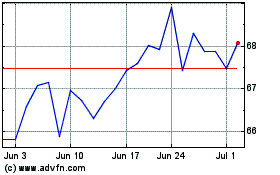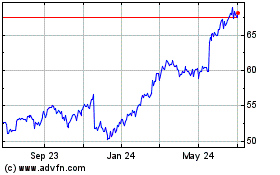By Sarah Nassauer and Josh Zumbrun
The U.S. decision to impose tariffs on Chinese bicycles,
handbags and thousands of other consumer goods won't hit most items
that will be in stores this holiday season, but retailers are
hustling to speed some shipments through ports and bracing for
higher costs next year.
President Trump said Monday he would slap the new tariffs on
about $200 billion in Chinese imports, including typical holiday
purchases such as Christmas lights and wrapping paper. The 10% duty
will take effect Sept. 24 and will rise to 25% at the end of the
year, according to administration officials.
The timing means most holiday goods for 2018 aren't likely to be
subject to big price increases, said industry consultants and
executives, because many leading chains like Walmart Inc. and J.C.
Penney Co. already have imported most of their winter items, and
the strong U.S. economy will allow retailers and their suppliers to
absorb much of the initial costs.
"Ten percent seems like a wash with the appreciation of the U.S.
dollar, " said Murali Gokki, managing director at consultancy
AlixPartners. But, he said, over the holidays the tariffs could
affect smaller retailers that ship seasonal items late or retailers
importing hot items at the last-minute.
"Most large retailers already have landed most of their holiday
goods by the first of October," said Chris Sultemeier, former
executive vice president of logistics for Walmart, who left the
world's largest retailer last year. He said the tariffs will have a
greater impact on goods that will arrive at U.S. ports in November,
December and beyond. Retailers probably will try to accelerate
spring products through customs before the potential 25% tariff
takes effect, he said.
The initial tariffs implemented by the U.S. earlier this year
have had mostly limited macroeconomic impacts because the goods
affected by them -- including washing machines and solar panels --
were a small part of the economy. The latest tariffs against China
significantly raise the stakes, with tariffs now hitting about 11%
of total U.S. imports and around half of all trade with China.
While some companies can shift their supply chains to avoid the
tariffs, the impact could be unavoidable for others, said Craig
Allen, the president of the U.S.-China Business Council, a
Washington trade group which represents American companies doing
business in China. "There's no doubt there's a huge amount of ships
on the water right now whose products will be affected by this," he
said.
An analysis from Moody's estimated the planned trade
restrictions would exact their greatest toll next year, reducing
the U.S. economy's growth rate by 0.25 percentage points in 2019.
Moody's estimates the economy will grow 2.3% in 2019, a sharp step
down from the 4.2% annualized rate reached in the second quarter of
this year.
Some products will be hit indirectly. The latest round will
affect some toy companies that finish their products in the U.S. as
a result of tariffs on dyes and some materials that are used in
packaging, said Steve Pasierb, president of the Toy Association
Inc., a trade group whose members include Mattel Inc. and Hasbro
Inc.
"It's survivable, not a crisis," Mr. Pasierb said. Finished toys
like Barbie dolls and Nerf guns haven't been hit by tariffs yet,
but Mr. Pasierb worries they will be as the trade tensions
escalate. "They're running out of things to put tariffs on."
The latest tariffs list will hit many consumer and household
goods, including knit hats and plastic raincoats, handbags and
wallets, toaster ovens and power tools. Other items, including
Apple Inc. smartwatches and Nike Inc. sneakers, aren't
included.
Many retailers said Tuesday they were still evaluating the list
of products subject to tariffs and talking with suppliers, saying
it was too soon to change course. They had warned ahead of the
decision they cannot easily shift suppliers and that for certain
items there aren't factories outside China ready to produce
them.
"This year's holiday orders have already been placed, and orders
for next Spring are well in process," lawyers for J.C. Penney wrote
earlier this month to the administration. They noted the department
store makes purchasing decisions up to a year in advance and that
it can take more than two years to find and audit new
suppliers.
The retailer said China accounts for 79% of imports of knit hats
and that the next biggest importer, Vietnam, accounts for 9%. "For
product after product, there is little to no production capacity
outside of China," the company said. A spokeswoman declined to
comment further.
Matt Priest, CEO of the Footwear Distributors and Retailers of
America, whose members include Nike and DSW Inc., said the tariffs
could hurt shoe sales even if footwear isn't included on the list.
"If you start driving up costs, it influences the amount of
discretionary income that consumers have," he said. "July was our
best month ever for shoe stores and then we move into this
uncertainty, which is very concerning to us."
As tariffs are implemented, retailers are likely to try to
minimize price increases for consumers, asking suppliers to bear
some of the cost, reducing their own margins slightly and passing
some of the cost along to consumers. "Retailers are sensitive to
who is going to be the first mover," and will work to cut costs to
limit price increases, said Mr. Gokki at AlixPartners.
"We are closely monitoring the tariff discussions and are
actively working on mitigation strategies," a Walmart spokesman
said. "One of those mitigation strategies is to understand what our
suppliers are doing and what their plans and alternatives are."
The latest action -- a 10% tariff on $200 billion of goods --
would increase costs by $20 billion. If that price increase
happened in one quarter, it would cause a one-time bump in the
inflation rate of about 0.5 percentage points, according to an
estimate from PNC Bank senior economist Bill Adams. Mr. Adams said
companies could import some goods from elsewhere, reduce profit
margins or pursue other strategies that partially mitigate the
price impact.
Customs brokers have been focused on working out which of their
customers will be subject to the new duties and whether their
shipments will beat the Sept. 24 deadline. The phone "hasn't
stopped ringing for weeks," said Mike Lahar, corporate compliance
manager at customs broker A.N. Deringer Inc. "If you're shipping
ocean you're probably going to be out of luck if it's not already
on the water."
--Paul Ziobro and Erica E. Phillips contributed to this
article.
Write to Sarah Nassauer at sarah.nassauer@wsj.com and Josh
Zumbrun at Josh.Zumbrun@wsj.com
(END) Dow Jones Newswires
September 18, 2018 15:45 ET (19:45 GMT)
Copyright (c) 2018 Dow Jones & Company, Inc.
Walmart (NYSE:WMT)
Historical Stock Chart
From Mar 2024 to Apr 2024

Walmart (NYSE:WMT)
Historical Stock Chart
From Apr 2023 to Apr 2024
